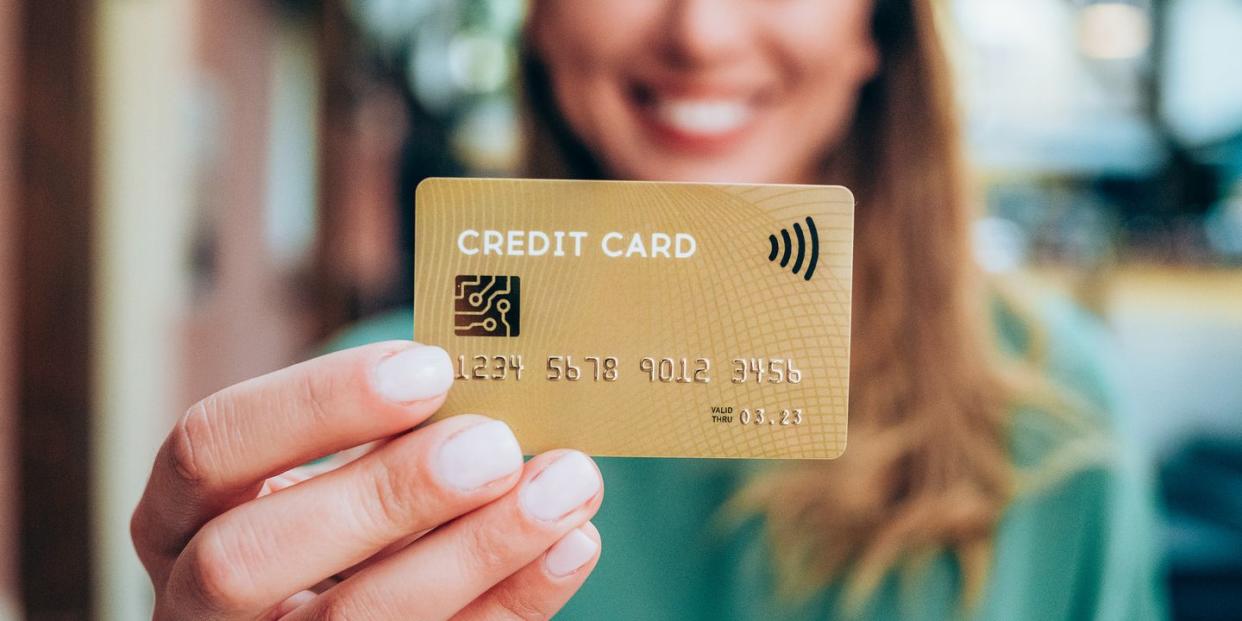Everything You Need to Know About Credit Cards

Figuring out how a credit card works and which one is best can be more difficult than trying to decipher Kendall Jenner's current relationship status, but it doesn't have to be that way. If you're heading off to college soon, now's the perfect time to school yourself on those little pieces of plastic that come with a lot of power and hella responsibility. Here's exactly what you need to know, like can you even get one even if you're a student (probably) and should you be using it for every Chipotle purchase (probably not)?
Who can get a credit card?
If you're at least 18, you're eligible. But if you're under 21 and don't have any credit history, it can be a little trickier to get your hands on one, which brings me to...
Hold up! What even is credit history?
Think of it as your financial reputation. It's a record that shows every time you've borrowed money, and how good you are at repaying it back. Lots of things show up on your credit history: Any loans you've taken out, including school ones, bills you haven't paid, and of course, all of your credit card stuff, too.
Based on all of that, you're given a credit score, which reflects the health of your personal finance. Think of the number as a game and your goal is to keep it as high as possible. A great score is anywhere from 700 to 800; a good score is between 600 and 700; anything below 600 needs some work.
OK, so how do you get a credit card?
There are two solid options: You can ask a parent with credit history to co-sign for you. When your parent co-signs, that means they've got your back; they're telling the bank, "Hey, I know my kid doesn't have an income stream yet, so I'm offering my income stream in place of theirs." Because your parent has co-signed, they take on the responsibility to pay off the debt on the credit card, should you, the student, not be able to. There are three credit card companies that will allow you to apply for a card with a co-signer: WellsFargo, Discover, and Bank of America. If you don't want to go that route, then specific stores, like Macy's and Victoria's Secret, are usually easier to get approved at when signing up with a parent, so you may want to start there. This will help you start building your own credit history (it's what I did at 16!).
Are the parents not down? Time to move on to Plan B: Get a secured card, which is where you save up a specific amount of money first (at least $300, but not more than $4,000) and put it into an account for the bank that's issuing the credit card to hold onto. It's a safety net for the bank — if you don't pay off your card, then they'll keep your money.As for those credit cards with super cool perks, like free airline tickets or money off every time you fill up your car with gas? TBH, companies just won't offer those up to you yet. You have to have a decent annual income (translation: a steady income/not broke) and more credit history.
Am I ready for a credit card?
Your goal for getting a credit card should be to build up a credit history, so when it's time to adult, like when buying a car or applying for your own apartment lease, you have a good track record of paying things on time. If you think credit cards are A) free money, B) an excuse to splurge on something even though you don't have the cash, C) the perfect reason to treat your entire squad to Starbucks every Friday, or D) all of the above, then you're not ready. If you don't have the cash to pay back what you're spending, you shouldn't be charging it to a credit card.
You should also know a few things before signing your name to anything:
Understand the card's fees. That means knowing what you'll be charged annually, as well as what you'll be charged if you make a late payment.
Be clear on the interest rate. If you don't pay off your charges at the end of the month, the charges will be carried over to the next month and often increase by a certain percentage. How big that increase will be depends on your interest rate.
Know the card's limit. You can't spend whatever you want. Once you reach the maximum, you have to pay down the balance before spending more — if you go over the limit, you could be charged a penalty. Try always to stay below half the limit if possible.
What kind of credit card should you get?
It totally depends on what you're using your card for. Are you planning to study abroad and want a card that will give you travel rewards so you can book some extra flights for spring break? Check out this list of the best rewards credit cards. Maybe you're less about rewards and more about just gettin' dat money, in which case you might want to consider a cash back credit card. Thinking about making a big purchase and not sure what kind of credit card you should use on it? Learn all about 0% APR credit cards here (especially if you have no idea what 0% APR means).
You Might Also Like

